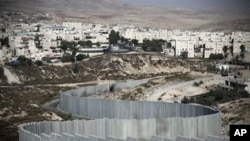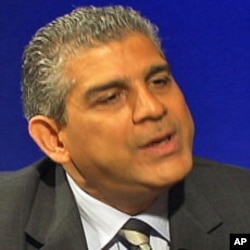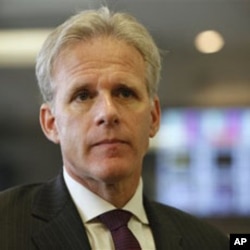A Mideast peace advocacy group says Jewish settlers have begun building at least 600 homes in the West Bank since an Israeli construction moratorium expired last month.
Peace Now said Thursday the rate of construction is four times faster than before the 10-month settlement freeze was enacted in November 2009. The group, which says it advocates for a two-state solution in the Israel-Palestinian peace process, has promised to release a full report soon.
Direct peace talks between Palestinian and Israeli officials are on hold because of disputes over settlement construction in territory Palestinians want for a future state, including land in the West Bank and East Jerusalem.
The Israeli ambassador to the U.S., Michael Oren, and the PLO representative to the U.S., Maen Rashid Areikat, recently spoke to VOA about a number of issues, including security, loyalty oaths, right of return of refugees, borders, international involvement in the peace process, and West Bank settlements.
Here is a sampling of those interviews, on the topic of Israeli construction of communities on land that the Palestinians consider to be theirs. For the complete interviews, please listen to the audio files.
|
Maen Rashid Areikat, PLO Representative to the U.S., speaks with VOA on 14 Oct 2010:
|
HILLEARY: Earlier this month Israeli Prime Minister Benjamin Netanyahu said he could revive the freeze on settlements if the Palestinians would recognize Israel as a Jewish state. The Palestinian leadership rejected that.
AREIKAT: The Israelis are portraying these issues as first-time issues that have been discussed with the Palestinians. On the issue of the settlements, it’s a very, very well-known issue that the Palestinians have always opposed the settlements. The international community opposed settlements.
Even the United States administration considered settlements illegitimate, illegal and rejected Israeli actions that were aimed at changing facts on the ground. So our position vis-à-vis settlements is not new.
|
Michael Oren, Israeli ambassador to the U.S. speaks with VOA on 15 Oct 2010:
|
HILLEARY: Israel has opened up bidding for the construction of more homes in East Jerusalem. Are you concerned that this decision will further complicate efforts to get back to the negotiating table with the Palestinians?
OREN: They shouldn’t. This is not a change in policy for the state of Israel. This is Israeli policy going back to 1967. We reached a peace with Egypt with a very similar policy, with Jordan with this policy. We negotiated with the Palestinians for 17 years with this policy.
The current government has shown immense restraint in building in Jerusalem, but Israeli policy has remained unchanged for 43 years: Every Jew and every Arab has the right to build anywhere in the city just as any American has the right to build anywhere in America.



